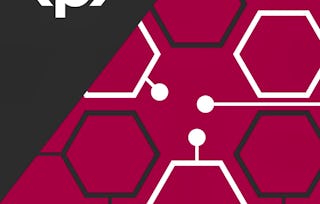Rust For DevOps is an intermediate level course for software engineers, system administrators, and technical professionals looking to apply DevOps principles using Rust. This course is for you if you have beginner level programming experience and are familiar with Linux, Git, and Docker fundamentals.

Rust for DevOps

Rust for DevOps
This course is part of Rust Programming Specialization


Instructors: Noah Gift
2,629 already enrolled
Included with
16 reviews
Recommended experience
What you'll learn
Apply DevOps principles and workflows to build, deploy, and operate applications using technologies like Rust, containers, logging, and monitoring.
Instrument applications with logging and monitoring using frameworks like ELK stack and Prometheus to gain observability into systems.
Automate system administration tasks like file parsing, command execution, and cron jobs using Rust to improve efficiency.
Skills you'll gain
Details to know

Add to your LinkedIn profile
5 assignments
See how employees at top companies are mastering in-demand skills

Build your subject-matter expertise
- Learn new concepts from industry experts
- Gain a foundational understanding of a subject or tool
- Develop job-relevant skills with hands-on projects
- Earn a shareable career certificate

There are 4 modules in this course
This week, you will learn how to explain the core principles and practices of DevOps including automation, monitoring, collaboration, and iteration. You will also learn to describe key considerations for DevOps-enabled applications like version control, testing, linting, packaging, and programming languages. Additionally, you will define containerization and how it relates to DevOps workflows. Finally, you will identify real-world examples and use cases of applied DevOps methodologies. You will apply these learnings by discussing DevOps fundamentals and relating them to your own experience working on technical teams and building applications.
What's included
20 videos11 readings2 assignments1 discussion prompt
This week, you will learn how to instrument applications with logging and monitoring using frameworks like ELK stack and Prometheus. You will install, configure, and connect monitoring tools to gain observability into your systems. By adding logging and custom monitoring endpoints to your Rust code, you will understand how to expose metrics and logs for collection. Finally, you will explore strategies like scraping versus pushing data, retention policies, and controlling verbosity. You will apply these concepts by implementing end-to-end monitoring for a sample application.
What's included
17 videos10 readings1 assignment
This week, you will learn how to automate common system administration tasks using Rust. You will build CLI utilities that can parse files, crawl directories, run external programs, and schedule cron jobs. By handling command output, reporting errors, and logging results, you will create robust automation scripts. You will also construct compliance checks that evaluate system state against policies, using JSON and other formats for reporting. You will apply these techniques to automate real-world tasks like log parsing, and compliance verification.
What's included
18 videos6 readings1 assignment2 ungraded labs
This week, you will learn how to implement continuous integration and continuous delivery pipelines using tools like GitHub Actions and Jenkins. You will understand core CI/CD concepts, components of a pipeline, and workflows for automating builds, tests, and deployments. By managing dependencies between jobs, implementing logic, and linting artifacts, you will create robust pipelines tailored to your project needs. You will apply these skills to build an automated CI/CD pipeline for a sample application.
What's included
15 videos7 readings1 assignment
Earn a career certificate
Add this credential to your LinkedIn profile, resume, or CV. Share it on social media and in your performance review.
Offered by
Explore more from Software Development
 Status: Free Trial
Status: Free Trial Status: Free Trial
Status: Free Trial
Why people choose Coursera for their career

Felipe M.

Jennifer J.

Larry W.

Chaitanya A.
Learner reviews
- 5 stars
62.50%
- 4 stars
12.50%
- 3 stars
6.25%
- 2 stars
12.50%
- 1 star
6.25%
Showing 3 of 16
Reviewed on Aug 28, 2025
Super awesome. I'm so glad I found this course. The instructor is so perfect. He speaks in cadence.

Open new doors with Coursera Plus
Unlimited access to 10,000+ world-class courses, hands-on projects, and job-ready certificate programs - all included in your subscription
Advance your career with an online degree
Earn a degree from world-class universities - 100% online
Join over 3,400 global companies that choose Coursera for Business
Upskill your employees to excel in the digital economy
Frequently asked questions
To access the course materials, assignments and to earn a Certificate, you will need to purchase the Certificate experience when you enroll in a course. You can try a Free Trial instead, or apply for Financial Aid. The course may offer 'Full Course, No Certificate' instead. This option lets you see all course materials, submit required assessments, and get a final grade. This also means that you will not be able to purchase a Certificate experience.
When you enroll in the course, you get access to all of the courses in the Specialization, and you earn a certificate when you complete the work. Your electronic Certificate will be added to your Accomplishments page - from there, you can print your Certificate or add it to your LinkedIn profile.
Yes. In select learning programs, you can apply for financial aid or a scholarship if you can’t afford the enrollment fee. If fin aid or scholarship is available for your learning program selection, you’ll find a link to apply on the description page.
More questions
Financial aid available,



